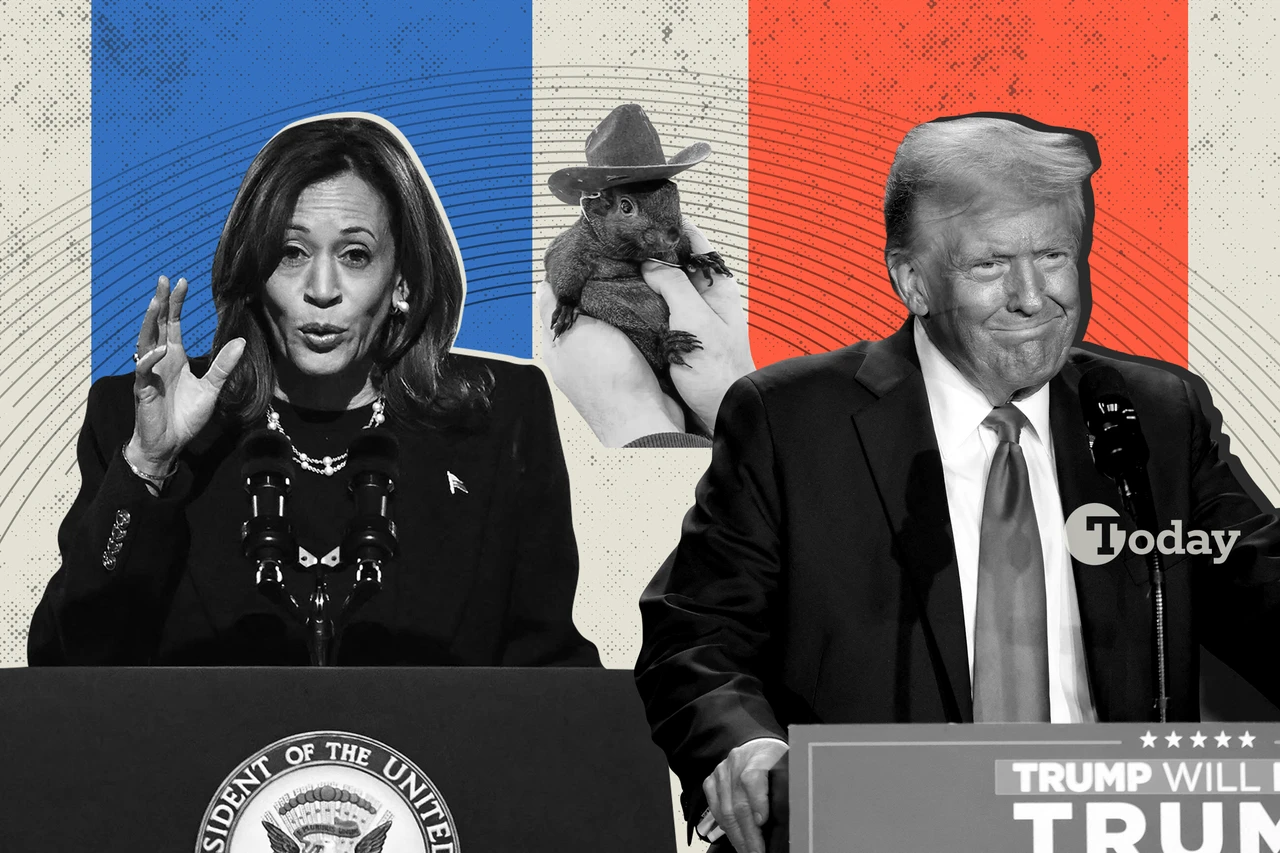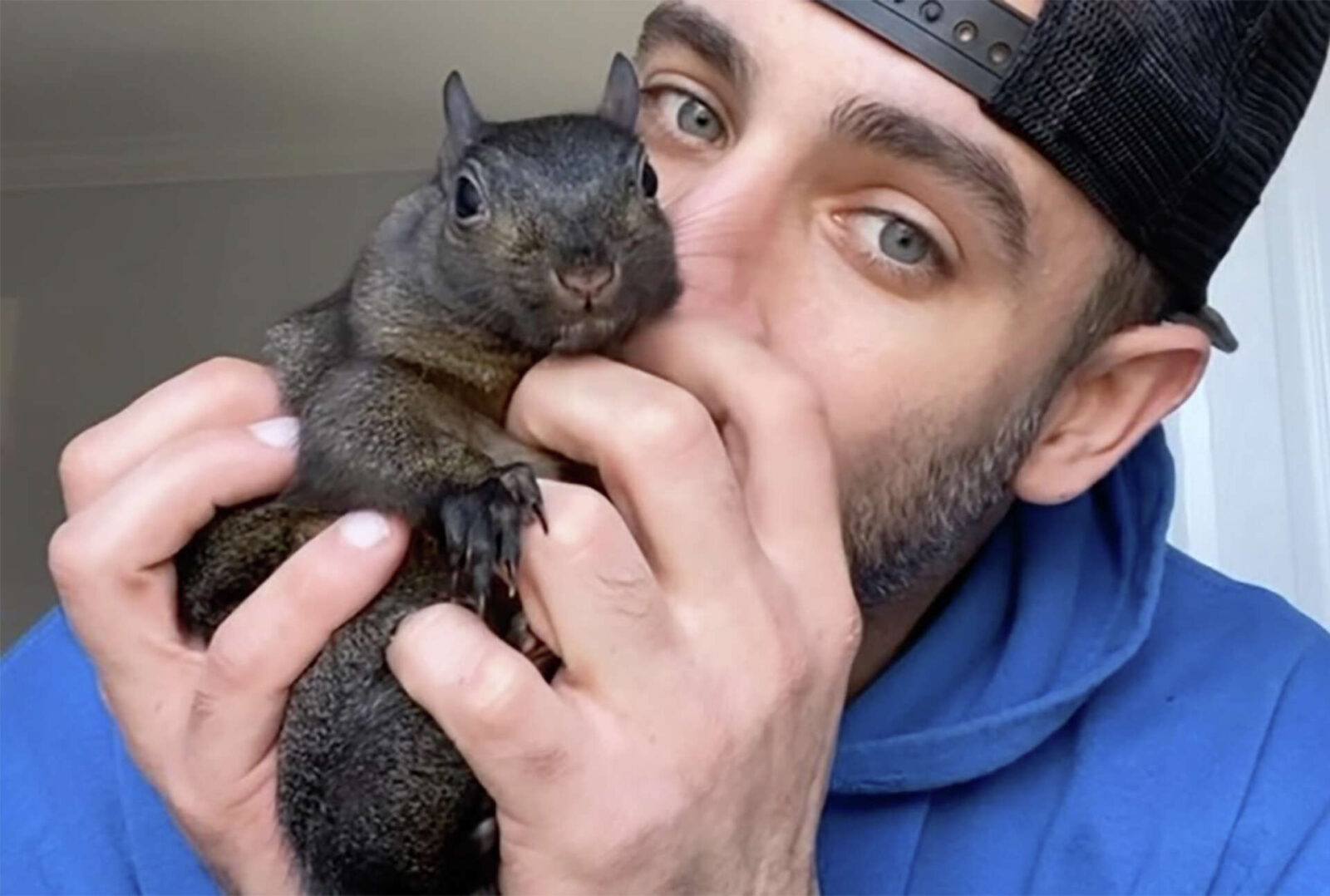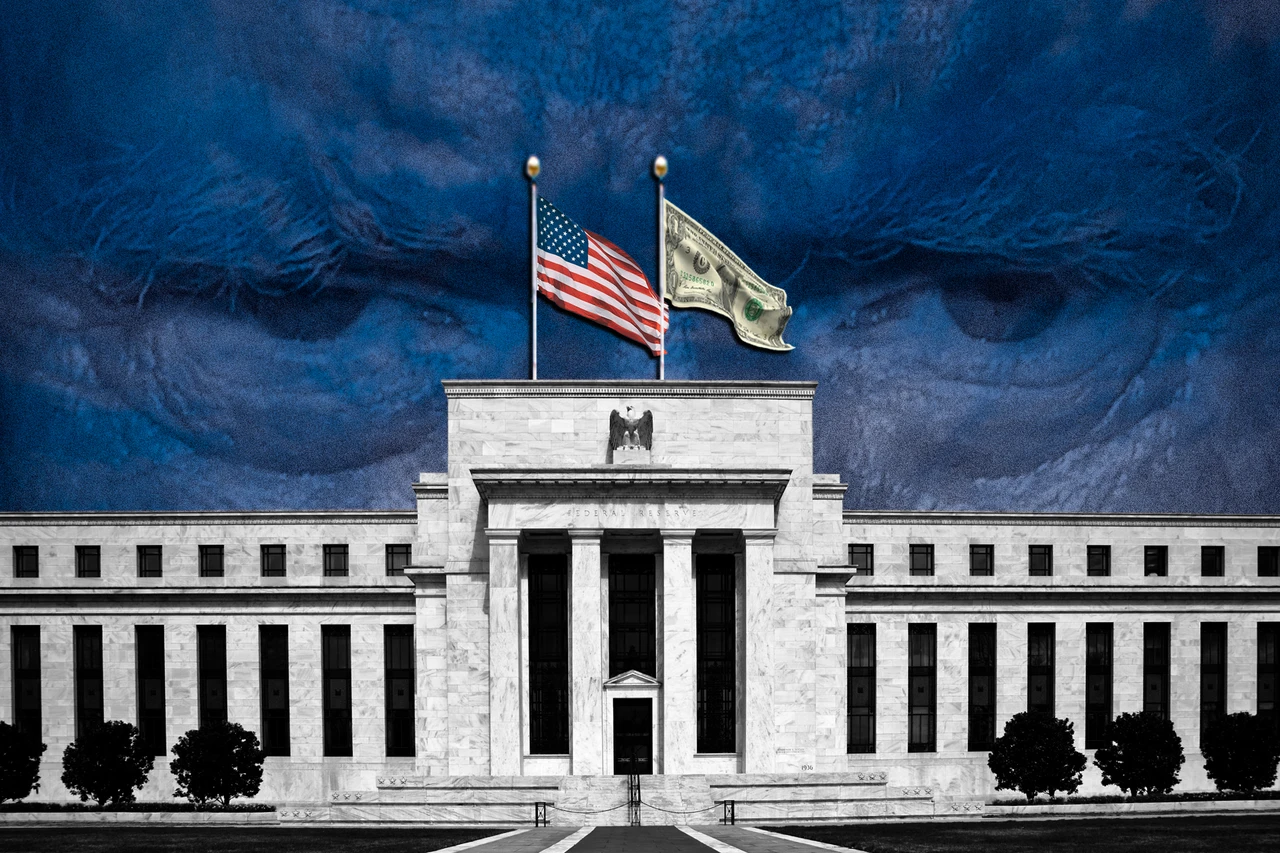How Trump missed chance to turn Peanut the Squirrel’s death into October surprise
 This collage features U.S. Vice President and Democratic candidate Kamala Harris, former President and Republican candidate Donald Trump, and Peanut the Squirrel. (Collage by Tugce Atmaca/Türkiye Today)
This collage features U.S. Vice President and Democratic candidate Kamala Harris, former President and Republican candidate Donald Trump, and Peanut the Squirrel. (Collage by Tugce Atmaca/Türkiye Today)
The euthanasia of Peanut the Squirrel on November 1, 2024, has sparked significant public outrage and controversy, becoming a focal point for discussions about government intervention and animal rights.

However, in the context of a contentious presidential race with few last-minute scandals, former President Donald Trump has seemingly missed an opportunity to transform this incident into an “October surprise,” a term used to describe unexpected political developments that can dramatically influence the outcome of an election.
Understanding October surprises
An “October surprise” is a politically charged term that refers to significant events or revelations that occur in the weeks leading up to an election, often with the potential to alter the landscape of the campaign. These surprises can take various forms, such as scandals, shocking news, or unexpected endorsements. They are typically leveraged by candidates to gain momentum or shift public opinion just as voters are making their final decisions.
Historically, some of the most notable October surprises include:
- 1972: The revelation of President Richard Nixon’s secret bombing campaign in Cambodia, which intensified scrutiny of his administration during the Vietnam War.
- 1980: The Iran Hostage Crisis, in which 52 American diplomats and citizens were held captive, significantly undermined President Jimmy Carter’s re-election bid and played a role in his eventual defeat.
- 1992: Bill Clinton’s campaign faced scrutiny when revelations about his extramarital affairs surfaced, leading to questions about his character and credibility.
- 2000: The Supreme Court’s intervention in the Florida recount, which effectively awarded George W. Bush the presidency, had profound implications for the election outcome.
- 2016: The FBI’s announcement to reopen the investigation into Hillary Clinton’s emails just days before the election shifted momentum in favor of Donald Trump.
As the 2024 election approached, the political landscape had not offered many significant surprises, leaving candidates searching for any opportunity to shift the narrative. The euthanasia of Peanut could have served as an emotionally charged issue, drawing attention to themes of government overreach and personal freedom.
Peanut the squirrel’s death: A missed opportunity for Trump
Peanut, a pet squirrel with a substantial social media following, was taken from his owner, Mark Longo, after a raid conducted by the New York State Department of Environmental Conservation (DEC) on October 30, 2024.

The raid followed anonymous complaints regarding the illegal possession of wild animals. DEC officials seized Peanut and another pet raccoon named Fred, ultimately euthanizing both animals due to rabies testing protocols after a DEC investigator reported being bitten by Peanut.
The public response to Peanut’s euthanasia was immediate and intense, with many condemning the DEC’s actions as excessive and indicative of government overreach.
Longo described the raid as traumatic, claiming that he was treated “like a terrorist” during the five-hour ordeal, during which DEC agents ransacked his home. Longo’s heartbreak resonated widely, prompting significant media coverage and sparking discussions about animal rights and government authority.
Political landscape and missed momentum
Despite the emotional weight and public outcry surrounding Peanut’s story, Trump himself did not engage with the incident as a significant campaign issue.
Reports suggested he expressed indignation regarding the situation, but his campaign quickly dismissed these claims as “fake news,” emphasizing that Trump had not made any official statements about Peanut’s euthanasia.
Trump’s running mate JD Vance, however, confirmed in a North Carolina rally on Sunday that the former President was “fired up” regarding Peanut’s death.
This lack of direct engagement is notable, especially considering the potential for the story to serve as a compelling October surprise that could have galvanized his base and drawn in undecided voters.
By not capitalizing on this incident, Trump missed a chance to frame the narrative around government overreach and individual rights – a theme that resonates with many of his supporters.
The emotional aspects of Peanut’s story could have been intertwined with broader critiques of government regulations, drawing parallels between the treatment of pets and the rights of citizens. This approach could have solidified his appeal among voters who prioritize personal freedoms and question government authority.
Role of social media, public sentiment
In today’s political climate, social media plays a crucial role in shaping narratives and mobilizing support. The story of Peanut gained traction online, with hashtags and posts reflecting the outrage felt by fans and advocates. Influential figures, including Elon Musk, weighed in on the situation, condemning the DEC’s actions and drawing comparisons to popular culture narratives that critique authoritarianism.
The viral nature of Peanut’s story provided a ripe opportunity for political messaging, yet Trump’s response – or lack thereof – limited his ability to harness this momentum. As public sentiment leaned toward anger over euthanasia, a well-timed engagement from Trump could have amplified the outrage, creating a rallying point for his campaign just as voters were preparing to head to the polls.
Elon Musk tries to politically leverage Peanut the Squirrel’s death
Elon Musk has made several pointed comments regarding the circumstances surrounding Peanut’s euthanasia, framing the incident as a clear example of government overreach. He characterized the actions of the New York State Department of Environmental Conservation (DEC) as “mindless and heartless,” labeling the Biden administration a “killing machine” for its role in the incident.
“The government should leave people and their animals alone,” arguing that the seizure of Peanut, who had been raised by caretaker Longo for seven years, amounted to an “execution of an innocent animal,” Musk stated.
By positioning euthanasia as a failure of government, Musk taps into broader frustrations with regulatory authority, suggesting that the incident reflects systemic issues within the Democratic Party’s approach to governance.
Pop culture comparisons, emotional appeal
To resonate emotionally with the public, Musk drew comparisons between Peanut’s fate and that of John Wick’s dog – a beloved pet that is killed, igniting a quest for vengeance.
“Government overreach kidnapped an orphan squirrel and executed him,” he tweeted, emphasizing the tragic narrative and appealing to pet owners’ sentiments. This analogy not only humanizes Peanut’s story but also frames it as a critique of government actions that prioritize regulation over compassion.
Musk’s rhetorical strategy effectively leverages popular culture to enhance his argument, inviting supporters to view Peanut not just as a pet but as a symbol of resistance against governmental authority.
Rallying support for Trump
Further intertwining Peanut’s narrative with political implications, Musk declared that “President Donald Trump will save the squirrels.” This statement aligns Peanut’s plight with Trump’s broader message of returning power to the people and pushing back against what Musk and others label as overreach by the Democratic administration.
By invoking Trump’s name, Musk not only seeks to galvanize the former president’s base but also positions himself as a key player in the ongoing discourse about personal freedoms and governmental control.
Musk’s posts about Peanut have included AI-generated images of the squirrel styled as various pop culture characters, further blending humor with political messaging. This blend of levity and seriousness serves to amplify his reach and impact on social media, encouraging supporters to engage with the content and share it widely.
Public response, cultural impact
Musk’s extensive engagement with Peanut’s story – reportedly posting around 20 times about it – illustrates his intent to shape public discourse. The reaction to his comments has been robust, with many supporters creating memes and tributes that echo Musk’s sentiments about government overreach and animal rights.
By transforming Peanut into a cultural icon of resistance, Musk effectively broadens the discussion beyond just the incident itself, inviting conversations about individual rights and the role of government.
This social media campaign illustrates how easily personal stories can be politicized, especially when they touch on themes of personal liberty and government intervention.
As discussions surrounding Peanut continue, Musk’s commentary contributes to a larger narrative that questions the Democratic Party’s policies and priorities, while simultaneously bolstering support for Trump and the Republican agenda.
Leveraging influence through X
Musk’s ownership of X provides him with a powerful platform to amplify his political messages and shape public discourse. His tweets dominate discussions, often going viral and reaching millions of users, thereby directly influencing the political landscape.
Studies indicate that Musk’s political content gains visibility rapidly within user feeds, allowing him to steer narratives in a way that benefits Trump and resonates with conservative audiences.
This influence is further bolstered by Musk’s financial backing of Trump’s campaign, reportedly exceeding $119 million, with significant contributions aimed at mobilizing support in swing states. His involvement in campaign events and rallies reinforces his role as a key supporter, helping to amplify Trump’s visibility and messaging.
New York Post covers Peanut the Squirrel extensively compared to liberal-leaning papers
In addition to Musk, the New York Post has been one of the Republican-leaning voices that covered Peanut the Squirrel’s death extensively, especially compared to liberal-leaning platforms like the New York Times.
The New York Post has covered the incident nine times, with three of the coverages being an exclusive.
The New York Post’s extensive coverage of Peanut the Squirrel’s euthanasia might be reflecting a strategic move, that is less obvious than Musk’s, to resonate with conservative voters ahead of the upcoming elections.
By focusing on this incident, the New York Post might be aiming to capitalize on themes of government overreach and individual rights – issues that are particularly salient for their readership and the Republican base.
The Post has positioned itself to lead the narrative by highlighting the perceived heavy-handedness of government authorities in the situation.
This framing aligns with longstanding conservative critiques of governmental intervention in personal lives, which could mobilize voters who feel similarly about issues ranging from taxation to regulations on businesses.
Visible contrast in coverage
Unlike liberal-leaning platforms, which have provided only limited coverage of the incident, the New York Post’s in-depth reporting serves a dual purpose: it informs readers with exclusive reporting, which gave Peanut’s owner Longo a voice that liberal-leaning papers didn’t bother to, while simultaneously stirring outrage and galvanizing support for the idea that governmental entities are overstepping their bounds.
By exposing the emotional turmoil experienced by Longo, Peanut’s owner, and amplifying calls for accountability, the Post seeks to rally conservative sentiments against perceived government excesses.
The coverage has also included commentary from political figures and pundits who frame Peanut’s story as emblematic of broader issues facing the electorate.
As various Republican leaders have begun to use the incident as a talking point, the Post’s detailed reporting provides the necessary context and emotional weight to support these arguments.
Broader implications for Trump’s campaign
The fallout from Peanut’s euthanasia illustrates the fine line politicians must navigate between seizing opportunities and appearing opportunistic. While some conservatives have rallied around the narrative of government overreach, Trump’s muted response indicates a missed strategic opportunity that could have played to his advantage.
As the election continues to draw near, Trump’s decision to not fully embrace this incident may reflect a broader hesitation to address emotionally charged issues that lack a direct policy implication.
In a campaign where surprises are scarce, Peanut’s tragic story could have provided an interesting backdrop against which to criticize the current administration’s regulatory stance, potentially reshaping the political discourse.



